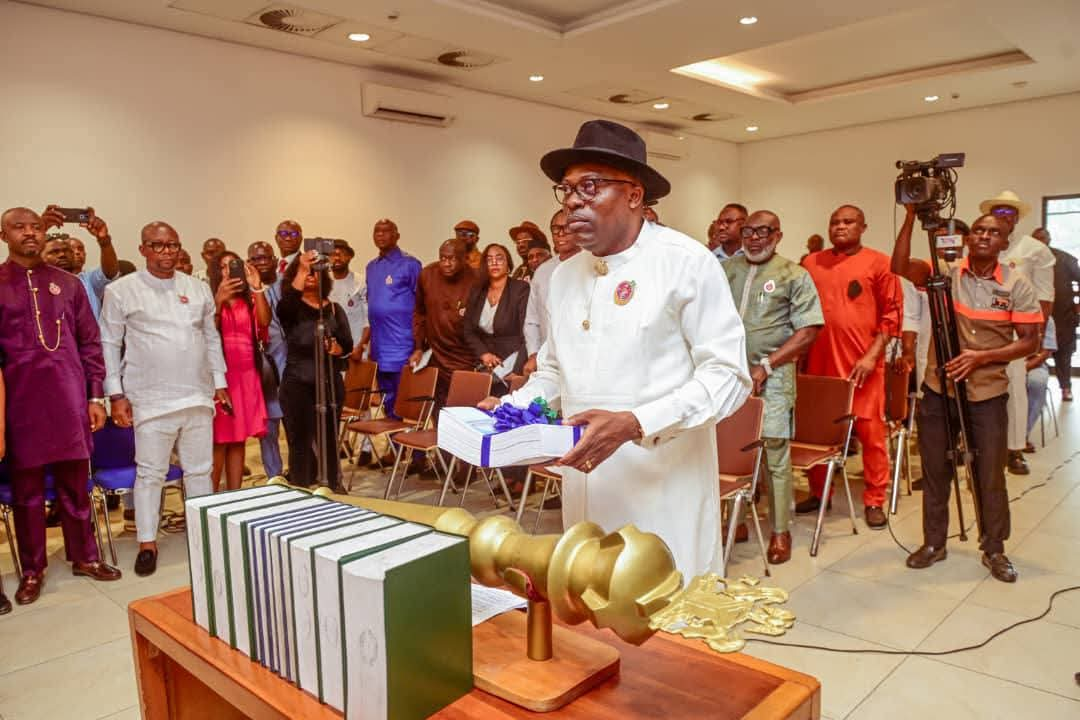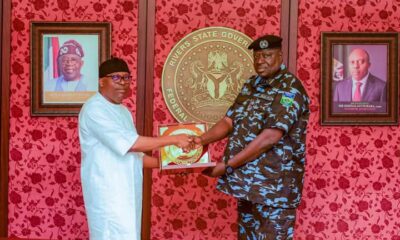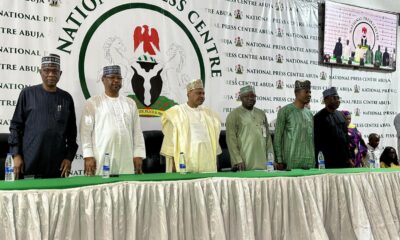Editorial
FG’s Proposed Mechanised Farming
When the Minister of Agriculture and Rural Development, Alhaji Mohammad Nanono, penultimate week, said that the Federal Government will begin an agricultural mechanisation programme in 632 out of 776 local government areas in the country, many cynics simply dismissed the initiative as another political gimmick that may not stand the test of time.
Some critics contend that, like other agricultural and rural development schemes in the past: Operation Feed the Nation (OFN) of General Olusegun Obasanjo’s regime, Shehu Shagari’s Green Revolution, General Ibrahim Babangida’s Directorate of Food, Roads, and Rural Infrastructure (DFRRI), Rivers Basin Development Authorities, among others, the proposed mechanised farming may also end up the same way. Good reasoning!
Sadly, Nigeria’s efforts at boosting the agricultural and rural development sector had been bedeviled by policy somersaults and inconsistency in policy implementation and this had been the bane of the nation’s overall development, especially in the post-civil war Nigeria.
However, The Tide is consoled by the new mechanised farming initiative under President Muhammadu Buhari’s administration.
Though the minister fell short of naming the 632 local government areas that will benefit, we strongly believe that, as he rightly said, the scheme would ensure that Nigeria achieves food security, job creation and economic growth in the near future.
“The initiative is expected to involve a full technology transfer package that would cover all stages, from agricultural production to industrial processing and marketing. It will also fully equip each of the LGAs with administration and information technology workshop”, the minister affirmed.
He added: “Each LGA will have service centres and each centre will have brand new tractor fully equipped with admin and IT workshop and also stores for seeds, fertilizer and excess produce and farmers will be linked to processing industries”.
Assuring that government will guarantee the mechanisation process and services, the minister enjoined individuals and groups to come with proposals on how to manage the service centres that will provide jobs and boost food production and food security across the country.
While we endorse the initiative, we implore the Federal Government to hit the ground running by ensuring that all critical stakeholders are involved in ensuring that the scheme takes off smoothly and is given the desired impetus in its implementation.
Most experts believe that the problem with Nigeria is not about policy formulation but implementation. Nigeria’s economy in the past five decades has largely depended on oil and gas, with little or no deliberate efforts made to diversify the economic base.
Over reliance on the hydro carbon industry has been a major challenge of our national development and well-meaning Nigerians and friends of Nigeria think that agriculture and agro-like industries remain the best option to follow.
It will not only provide employment for the teeming unemployed citizens but go a long way in solving the security challenge currently staring Nigeria in the face.
The Tide thinks that agriculture has the capacity for turning the nation’s economy around and lifting the country that is virtually stagnated in many fronts; infrastructural deficit, poor education and health facilities, insecurity, poverty, among others.
Perhaps, many will think that mechanised farming in 623 local government areas may be too ambitious for a government that is battling with so much challenges; terrorism, banditry, unemployment, militancy, poverty rate, among others, all that is required is the political will and commitment to weather the storm.
Adequate funding simply is the right way to go and government must, as a matter of expediency, map out a clear-cut road map to achieve the desired goal.
It will not also be out of place to involve the Organised Private-Sector (OPS) through Public Private Partnership (PPP) because in civilised climes such initiatives are usually private-sector driven. This programme must not be politicised if it is actually intended to see the light of day.
Editorial
Fubara’s 2025 Budget Of Inclusive Growth

Editorial
Opobo And The Proposed Higher Institution

Editorial
A New Dawn For Rivers’ Workers

Workers in the Rivers State civil service have been eulogising Governor Siminalayi Fubara for delivering on his promise to implement a new minimum wage of N85,000, which was reflected in the salaries paid for November. This increase is N15,000 higher than the national minimum wage of N70,000. This represents not only an enhancement in the financial welfare of civil servants but also a recognition of their hard work and dedication to public service. The raise has been met with widespread jubilation among the workforce, who have long advocated for a better wage to cope with rising living costs and economic challenges.
As the news spread, offices filled with laughter and sigh of relief, as employees exchanged stories of how this financial boost would positively impact their families and dependants. The new minimum wage is not just a number; it symbolises the government’s commitment to improving the standards of living for civil servants and fostering a more equitable workforce. Many workers expressed their gratitude for the governor’s timely intervention, highlighting how important it is for public servants to feel valued and adequately renumerated.
Governor Fubara’s decision is expected to reinforce morale within the civil service, fostering greater productivity and dedication among employees who contribute significantly to the state’s development. With the new wage in place, there is a renewed sense of optimism among civil servants, who now feel more empowered to serve the government and the citizens with greater enthusiasm and commitment.
The Governor had declared an increase in salaries for state workers, emphasising that this adjustment is not only a reflection of the government’s commitment to improving the welfare of its employees but also a strategic move fueled by the state’s enhanced Internally Generated Revenue (IGR). He assured workers that the financial backing for this increment is sustainable, stemming from the state’s focused efforts to bolster revenue through various initiatives, including tax reforms and enhanced efficiency in public service delivery.
Furthermore, the governor’s promise of funding the increment solely through increased IGR signifies a commitment to fiscal responsibility and transparency. It reassures the people that the government is proactively managing resources while investing in their future. As the state continues to explore opportunities for revenue enhancement, Fubara’s administration remains focused on ensuring that these initiatives translate into tangible benefits for the workforce, ultimately fostering a more motivated and dedicated public sector.
The decision by Fubara to be the first in Nigeria to implement the new national minimum wage is a commendable step that reflects a proactive approach to governance and an understanding of the pressing needs of the workforce. In an economy where many families struggle to make ends meet, especially in the face of rising living costs, this enterprise will improve the quality of life for workers and also set a precedent for other states to follow.
In recognising the various drives and support provided by Fubara’s government, it is necessary that the workers reciprocate by embodying a spirit of productivity and commitment to the current administration’s goals. They should align their daily operations with the administration’s objectives to enhance effectiveness and foster an environment of collaboration and trust. This reciprocal relationship can lead to innovative solutions and efficient service delivery, ultimately benefiting the state and strengthening public trust in government institutions.
Surprisingly, despite the political challenges the government has been navigating, alongside the myriad of ambitious projects it is embarking on, it has managed to raise funds to implement a minimum wage of N85,000 This achievement reflects a commendable level of resilience and resourcefulness within the government’s fiscal strategies. In a nation often marred by economic volatility and political discord, finding a way to sustain and even elevate the livelihoods of its employees is no small feat.
Workers in the state have truly found themselves in a remarkably advantageous position under this administration, especially when compared to the previous regime. The immediate past government’s blatant refusal to implement the minimum wage of N30,000 left many employees disheartened and struggling to meet their basic needs. What was even more disconcerting was the absence of meaningful negotiations with labour representatives, leaving workers feeling unheard and undervalued. In contrast, the present administration has prioritised dialogue and engagement with labour unions, recognising the importance of fair wage for workers’ contributions to the state’s economy.
With the current government’s commitment to improving wages and working conditions, it is clear that a major shift has taken place. This renewed focus on the welfare of workers empowers them and instils a sense of hope and optimism for the future, as they can now look forward to a more equitable and supportive work environment. Ultimately, the ongoing trajectory suggests a promising era for labour relations in the state, one where workers are valued and their rights upheld.
Siminalayi Fubara has consistently demonstrated his dedication to workers’ welfare since taking office in May last year. Unlike his predecessor, who left many employees feeling overlooked and unsupported, Fubara wasted no time in addressing the longstanding stagnation of promotions that had plagued the workforce for eight years. He took further steps towards financial justice by initiating the long-overdue payment of gratuities that were neglected during the last administration.
Similarly, we urge the governor to take another step forward by reviewing the stipends received by pensioners. The current pension amounts have become woefully inadequate, leaving many of them who dedicated their lives to public service struggling to make ends meet. These dedicated individuals who have contributed to the development of our dear state now find themselves in a precarious financial situation, receiving stipends that are alarmingly low and insufficient to cover basic living expenses. The rising cost of living has rendered their pensions nearly meaningless. Therefore, a comprehensive reevaluation of these stipends is a required measure to ensure that those who have served our state with honour can live their remaining years with dignity and security.
-

 Featured7 hours ago
Featured7 hours agoFG, States, Local Govts Share N1.42trn In January
-

 News5 hours ago
News5 hours agoDon’t Attend Nocturnal Meetings To Declare War On Rivers, Fubara Tells New CP
-
News7 hours ago
AUDA-NEPAD Nigeria To Electrify 1m Rural Communities In 2025
-
Niger Delta6 hours ago
You Have Our Ears, Fubara Assures Civil Servants
-

 News6 hours ago
News6 hours agoNigeria Ready To Host UNESCO Media, Information Literacy Institute – Minister
-

 News6 hours ago
News6 hours agoFubara Inaugurates Road Project To Celebrate Jackrich On Birthday
-

 Featured6 hours ago
Featured6 hours agoNigeria, S/Arabia, Deepen Ties On Solid Mineral Exploration
-
Niger Delta6 hours ago
RSBOPP Moves To Review Procurement Processes

